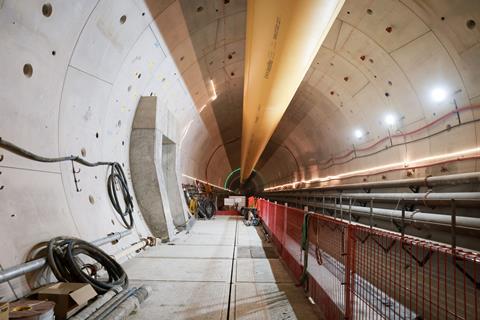Unfair to compare railway’s cost to those in Europe because of amount of tunnels and cuttings that have needed digging, Richard Robinson adds
The former chief operating officer of HS2 has cited local planning concerns as the reason for the project’s escalating costs which prompted ministers to scale back the scheme last year.
Richard Robinson, president, UK and Ireland at engineering giant AtkinsRéalis said these concerns meant much of the line on the first phase passes through more costly tunnels and cuttings.

He told Building: “HS2 costs escalated due to decisions during the hybrid bill process, the net result of which is 80% of the route from London to Birmingham is not at grade. This means it is either on a viaduct, in a deep cutting or in a tunnel.
“This was to mitigate local concerns, which is a key part of the UK planning process. This does, however, result in a more costly asset than, say, running at grade through the countryside as comparable railways in Europe do.”
The estimated cost of the project has repeatedly increased over the last decade, with HS2 executive chair Jon Thompson telling MPs in January the final bill could be up to £66bn, £10bn more than previous estimates.
The spiralling costs were a factor in Rishi Sunak announcing last October that phases 2a and the remainder of 2b, which would see lines built north of the Midlands to Manchester, was being cancelled, with HS2 only now running between London and Birmingham.
More on HS2
Tunnelling to HS2 station at Euston to start next year
HS2 fallout sees Labour and construction united by common aim
Sunak’s decision came six months after the government said trains into London would be stopping at Old Oak Common instead of the middle of the capital at Euston with escalating costs being blamed.
Robinson, who was COO of the scheme for just over a year between 2018 and 2019, said: “It’s really disappointing to see the cancellation of 2a as it leaves a hole in the whole network strategy of the north.”
He added that he has not been involved in the recent discussions between industry, the Labour party and regional mayors about alternative plans to fund a line from Birmingham to Manchester.
But he said he was in favour of an alternative going ahead: “I think we have got to do something that looks a lot like 2a, because otherwise we are going to end up with less capacity than we have now, if HS2 services go on to the main route and then there’s a whole question about connectivity of the north.”
The full interview with Robinson is due to be published on Building on Monday


























No comments yet